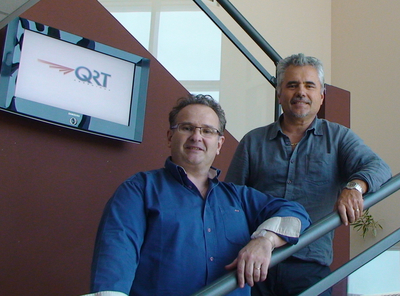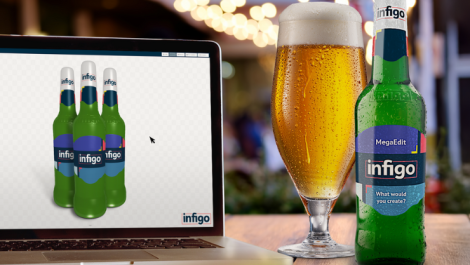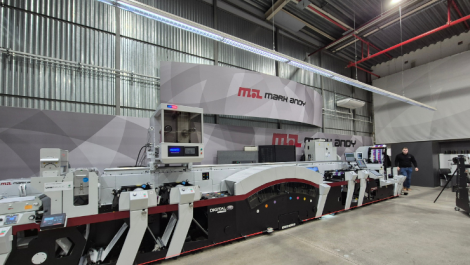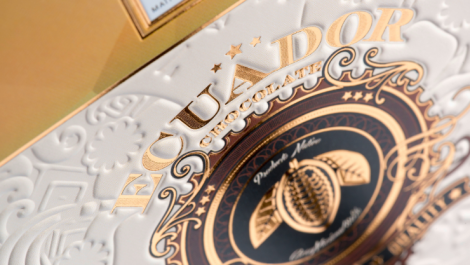Christophe Quirantes (left) and Philippe Quirantes manage the family-run business
QRT Graphique moves its adhesive labels printing business for food, chemical and cosmetics applications forward with Domino’s N610i digital press.
Since it was founded in 1977, new technology has been at the heart of QRT Graphiques development strategy. The company, which is located on a 10,000 msq site in the suburbs of Alès, has become a major player in the adhesive labels market and is recognised throughout France.
Every year, the company prints tens of millions of labels for its clients, covering the food, chemical and cosmetics industries, on a dozen production lines that include flexo, typo, offset and screen, however, print managers have been monitoring digital printing as a potential growth driver mainly for short runs.
For several years, the company has been following the evolution of digital presses waiting for the one that would be a perfect match for its production requirements in terms of productivity.
In early 2013, the company looked at the N610i in Domino’s demonstration centre in Cambridge. It ran printing tests on various materials and the results were conclusive, both in terms of quality and the speed of execution.
Other devices were reviewed, however, but Christophe Quirantès is confident they made the right choice, ‘We knew we could deliver larger runs with the innovative technology developed by Domino compared to the standard digital presses offered by other manufacturers.’
A few months later, the N610i digital press with four colours plus white became the first to be installed in France. Mr Quirantès said, ‘The choice to include white was motivated by the need to print on transparent synthetic gold and silver substrates, whereby white is essential to give correct colour matching. This allows us to get good opacity and it brings out the colours giving the label a vibrant appearance.’
Where short runs of 50 to 10,000 labels were previously associated with digital production, this has now extended to runs of thousands of copies. ‘With the piezo ink jet technology, we are now looking to replace our rotary typos because the N610i is just as efficient on medium run lengths. We have already printed a run of 400,000 labels in production,’ he continued.
Mr Quirantès believes that Domino’s piezo inkjet technology is the future for his sector. Furthermore, the QRT printshop can rely on the service and advice from Domino to ensure its digital press is always running smoothly and provides valuable input into the development of new products for its customers.
Reduction in lead times
With digital, the pre-press process is eliminated, which translates into substantially reduced production lead times. And that’s without taking into account the ease and speed of switching from one job to another; all you have to do is send the files to the press to start printing.
Mr Quirantès added, ‘With Domino’s N610i, the labels are already printed by the time we would have finished plating up on the typography press.’ The result is that, combined with the productivity of the N610i, which runs at 50 m/min in high definition, digital printing is proving unbeatable when it comes to speed. And, that doesn’t include the savings made on waste that is produced during plating up in flexo.
‘Since we’re running at a constant speed, it’s easier to organise our production planning and plan ahead,’ emphasised Mr Quirantès, whose print shop produces around 20 million msq adhesive labels a year.
A wider market reach
Its first investment in digital allows the company to position itself in new markets. For example, with medium size runs of multi-reference labels, the company can now produce the same label, but with different visuals, barcodes or Datamatrix codes. This could not previously have been achieved with flexo printing.
Christophe Quirantès is also pleased with another strength of the digital inkjet press, ‘We are attracting new customers, as UV inks produce a screen-printed likeness. It gives the impression of being thicker to the touch, and provides increased abrasion resistance compared to traditional printing. There are a number of sectors where these qualities are extremely important, for example with the transportation of products in boxes and ensuring that the labels are not damaged on arrival.’
The proof is in the product
The company’s introduction of digital has even led to modification of its sales policy. Now, when sales personnel visit a prospective customer, they do not spend a lot of time talking about the quality of the new press, and rather ask for a test file and return a printed copy of the label within 48 hours. ‘This technology is enabling us to get our message across to prospective customers, as they can have their own product in their hands extremely quickly,’ added Mr Quirantès. ‘We are bringing something new to the market and differentiating ourselves, which is essential with nearly 300 labels manufacturers in France.’
After an initial expansion drive in 2011, which included acquisition of a print shop and the establishment of a sales office in Paris, QRT Graphique is preparing for the next stage. The N610i’s productivity and print quality allows the company to conquer new markets across France during this expansion period, and stand its ground against the competition.






